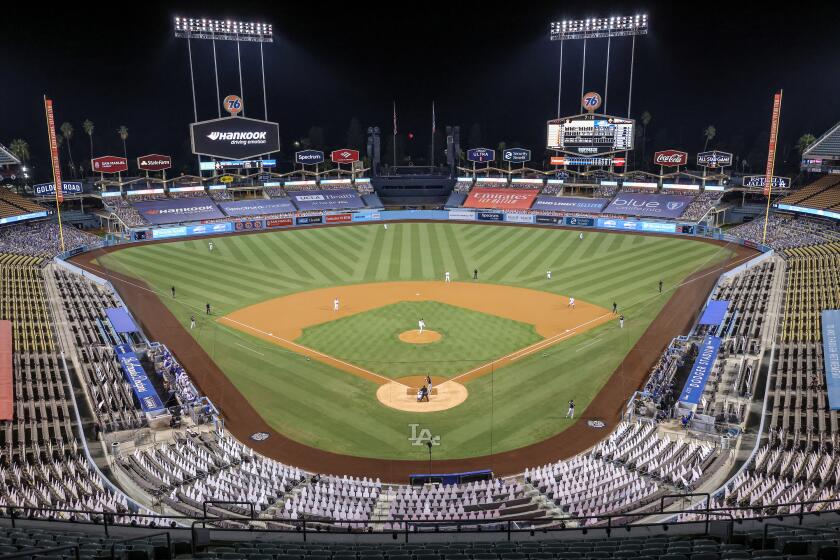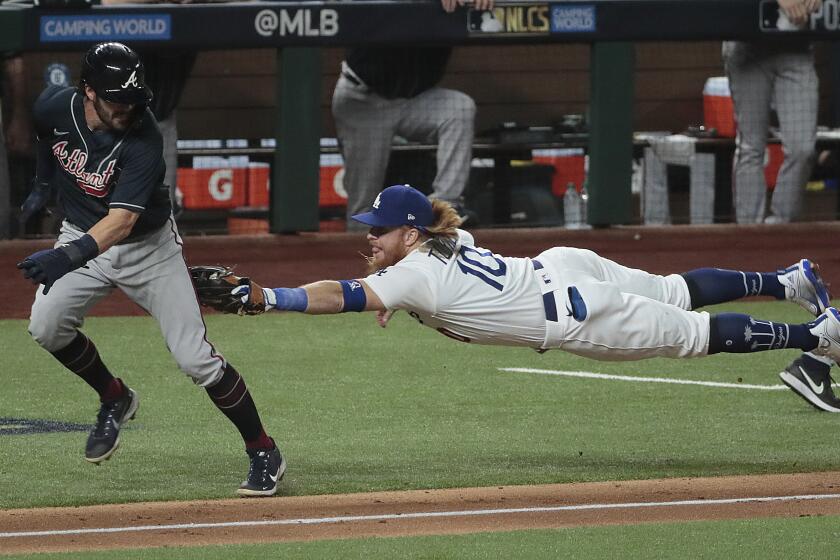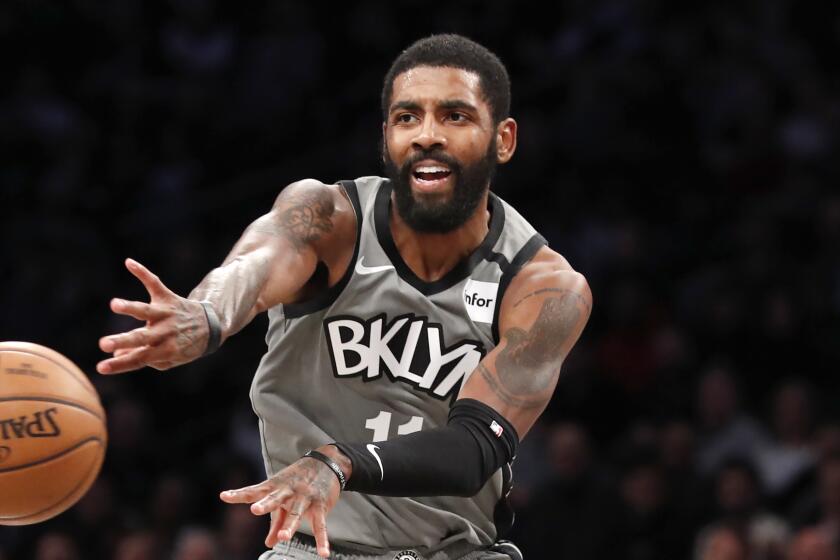Todd McLellan expecting the unexpected in his second season with Kings
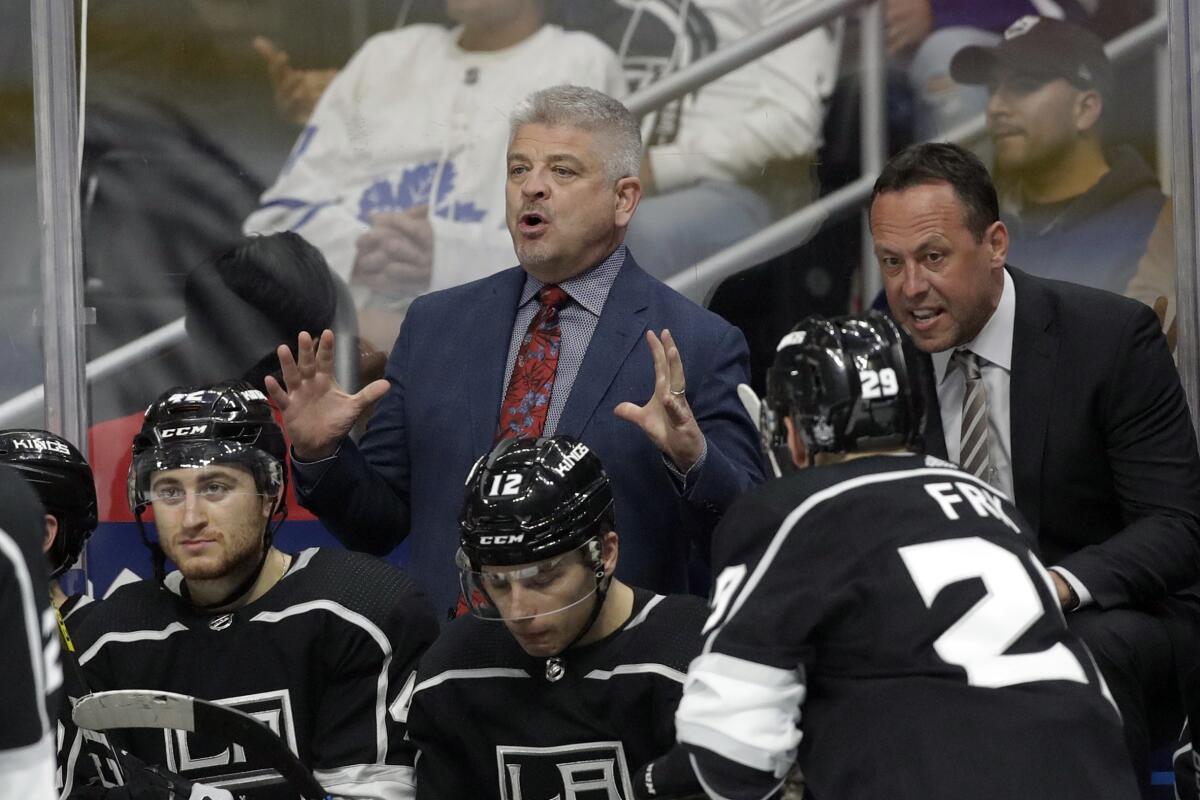
- Share via
Ever since he and his staff returned to work at their El Segundo offices in late August, Kings coach Todd McLellan has kept a big calendar on the wall.
Hardly a week has gone by since where he hasn’t erased, revised and adapted to the league’s ever-changing — and still not yet finalized — plans for the upcoming season.
“My life has been good from a family and health standpoint,” McLellan, entering his second year behind the Kings’ bench, said during a wide-ranging phone interview Friday. “But from a professional perspective, it’s been a roller coaster.”
Here’s what is known about the 2020-21 NHL season: It won’t start before mid-January, at the earliest. It will include a shortened schedule, likely between 52 to 56 games instead of 82. Divisions will be realigned to account for travel restrictions between the U.S. and Canada, possibly forcing the Kings to play a much tougher schedule than usual. And circumstances could change at any moment, with coronavirus cases across the continent mounting and the league set to play games outside of a bubble for the first time during the pandemic.
No MLB team is selling tickets to spring training because no one knows when it might start, or for that matter when the regular season might start.
“It’s going to be baptism by fire, really,” McLellan said. “We’re going to have to be reactive, we’re going to have to be expecting of wrinkles thrown in. We’re not in control. We have to adhere to what we’re told and be prepared for it. We can whine all we want. Doesn’t matter. Just do it, worry about the things that we can control, and that’s how we’ll approach it.”
McLellan knows this will be unlike any season of his 12-year NHL head coaching career. The Kings will have to overcome a 10-month layoff, having not played since the 2019-20 regular season was suspended in mid-March.
“You’re going to hear me use the word a lot: ‘reestablish’ — we have to reestablish so many things when we get back as a group,” he said. “We [coaches] were rusty … Once you get into the discussions, you go, ‘Oh yeah, I forgot about that. That’s really important.’ That came up more than once. So if we have forgotten or have slipped a little bit, I’m sure the players will have as well.”
The Kings’ schedule could turn into a year-long gauntlet, as the Pacific Division’s three Canadian teams (who are expected to play in a temporary all-Canadian division this year to eliminate travel across the border) could reportedly be replaced by some combination of the Minnesota Wild, St. Louis Blues, Colorado Avalanche and Dallas Stars — the latter three of whom finished in the top four of the Western Conference last season.
“However that ends up, we’re going to have to take advantage of and try and do our best,” McLellan said. “Will our division or our region be stronger or weaker? I don’t know. We just have to play the teams we’re assigned to play and do the best we can.”
And then there is the all-important matter of continuing the club’s rebuilding process. The Kings roster figures to look younger and more inexperienced this season, as more prospects come through the pipeline and onto the NHL roster.
Justin Turner epitomizes Dodgers culture more than anyone not named Clayton Kershaw, and the veteran third baseman should finish his career in L.A.
McLellan is optimistic that the Kings’ “talent pool is increased” from last year, when they went 29-35-6 and missed the playoffs in consecutive seasons for the first time in more than a decade, adding that “in all areas, we’re further ahead.”
“But that doesn’t shorten the workload at all for us,” he countered. “Game 1, there’s gonna be two points on the line and we haven’t played for 10 1/2 months. It’s not going to be easy. Nobody expects it to. But it also can’t be an excuse. We’re going to try and do everything we can to put them in a situation to be successful, healthy and ready.”
With that in mind, here is more from Friday’s conversation with McLellan on what the upcoming season holds, how the Kings will manage the complications of playing during a pandemic, and other news and notes about the roster and beyond.
(Note: Some questions and answers have been edited for length and clarity).
Q: What have the last nine months been like for you? How much have you been thinking about hockey, or taken a step back, during this weird time?
A: “The one thing we did as a coaching staff both at the American League level and the NHL level, and with a lot of the development team put in place, is we basically approached the season like it was going to be a normal one. So we came back to Los Angeles, came into work starting in late August, early September, and have been meeting almost on a daily basis, discussing different parts of the game, our lineup, looking at what other teams are doing and trying to stay hockey busy.”
Q: How challenging has it been to keep a schedule, to keep those routines, when you don’t know what the end date of it all is and when the season will be?
A: “I have found that since we’ve been back and established a routine of coming to the rink each day basically at the same time that we would in a regular season — obviously, the amount of hours we’re spending here are shorter — but I found it’s easier to work that way. It feels more normal. We’ve been able to go through numerous areas of our game with our American League team and our development coaches. That’s probably something we have never done in the past or never had the time to do. We’ve now done that. We’ve tried to clarify language. Systematic play. We do have a new American League coach in [John Wroblewski] and it’s been really good, I think, for them and for us. That process has allowed us to refresh our own memory bank and hockey minds.”
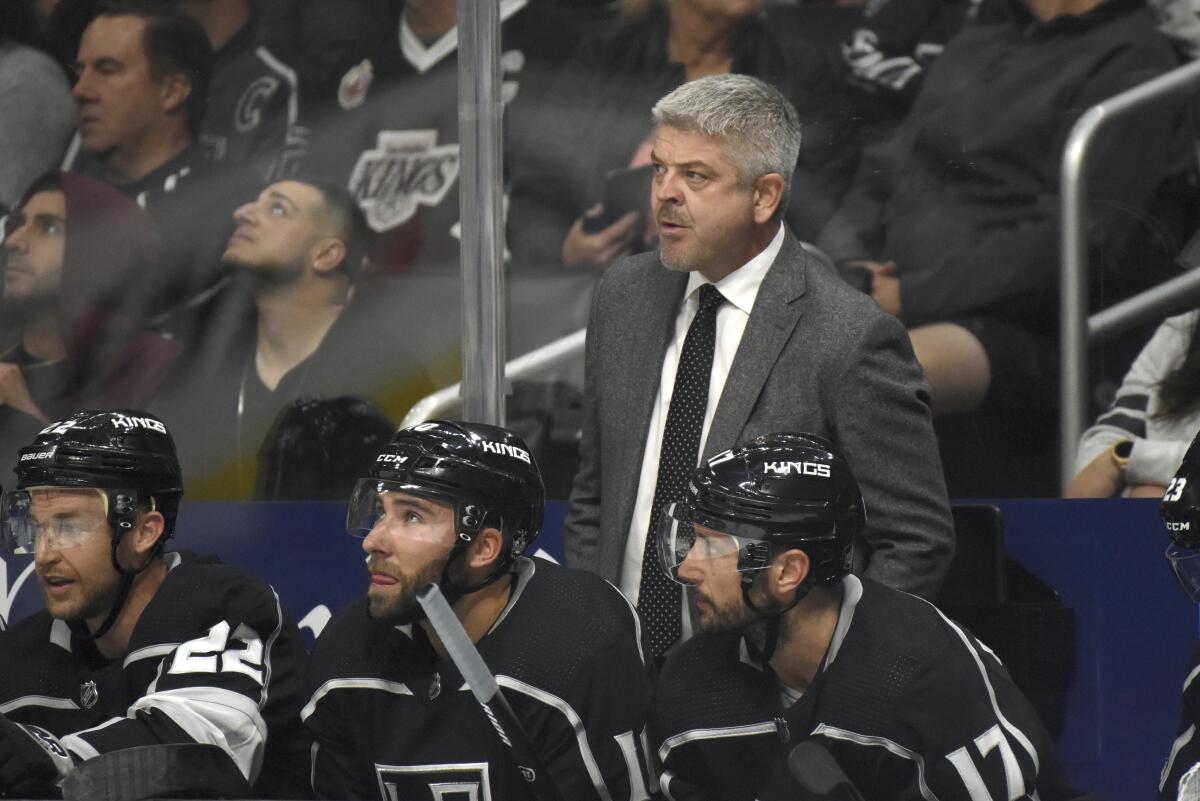
Q: How much time this offseason did you spend reviewing last season? Did that change your perspective at all, or make you feel any better or worse about where you guys ended things a year ago?
A: “The review happened in phases. The immediate review was with the individuals reviewing the way they played and the things that we thought we needed them to do over the summer, giving them feedback. There was also a review of how we played the game, what we liked, what we didn’t like. And then we took a pause and we took our normal summertime where we got away from it.
“But during that time, we were watching the playoffs, we were watching the bubble games and picking things up from other teams. And then when we came back here, we’re back to combining everything: What we did in the past. What we want to do in the future. What are some other teams doing that we think we can steal and put into our game. Has the game changed? And our roster’s changed. That’s turned over, so where are we going to use guys? How will we use them? All of those things have come into play.
“We feel good about where we’re at right now, structurally. We feel good where we’re at right now with the coaching staff being prepared and ready for a camp. The players that have been here [training] in L.A. for extended periods, we’ve started those relationships up again and we’ve been able to watch them skate and in the gym. That part feels normal. It’s just the game reward, the wins and losses haven’t been coming. We feel like we’re in a better spot right now than we were last year at training camp time because we’ve laid some foundation work down.”
Q: You had the strongest part of your season last year right at the end (the Kings won their final seven games before the schedule was suspended) and in normal times, that’s some momentum you probably could have carried over. Can you still carry that momentum over, or after this many months is it a fresh start for you guys?
A: “I think we’re closer to a fresh start than we are to carrying momentum over from 10 months ago. It’s just so far in the past. Now, we also have strong memories we can refer back to. At that point in the season, we were doing a lot of things right structurally and team-wise, and we were getting rewarded for it. So we know it’s somewhere in the bank. We just have to go and draw on it again. But to think that we could just put our skates on and get rolling and be the team we were at the end of the year, that would be a huge error, I think, on our behalf. We have to reestablish everything. We have to reestablish and remind players there’s a right way of doing it and then go from there. So I think we’re closer to getting back to camp and, not necessarily starting over, but picking up from where we left off and reestablishing.”
Q: What have your recent coaches meetings looked like? Have social distancing rules limited what you guys are able to do in those settings?
A: “Again, everything in these meetings has changed. We would normally meet in our little war room [downstairs at the team’s Toyota Sports Performance Center in El Segundo]. We don’t have the space to do that. So we found a very big conference room. We’re spread out properly, masked. The video is up on a big screen at a distance that’s further away. So all the health protocols are followed exactly the way they’re supposed to be.
“We picked parts of our game on a daily basis and talked about them: ‘This is how we would like to do it. This is how we teach it. This is where we think strengths are in these particular systems and weaknesses. What are some of the skill sets that are involved in it?’ That’s where the hockey development team comes in and we’ve never been able to do that with them, where we say, ‘This is required of this type of player.’ Take the forecheck for example. We could be talking about forecheck for three days because we’ve been able to break it down to what’s required in a player to do this. If you’re big and heavy, can you be different than if you’re smaller and quicker and still be effective? We’ve probably overcooked it, but it’s been pretty enlightening, an unreal experience for me, and I’ve been in the league forever. So hopefully everybody’s enjoyed it the same way I am.”
Brooklyn Nets point guard Kyrie Irving responded Friday morning after being fined by the NBA for refusing to take part in team media availability.
Q: What is your big-picture view of the roster right now? The things that excite you? The things that are still unknowns?
A: “We feel comfortable in goal ... [Jonathan Quick] and Cal [Petersen], in particular, we feel really good about them coming back and the way they work together and the type of games they ended with [last year]. Quickie, from Christmas on, was one of the top goaltenders in the league and Cal coming in, he performed very well for us during that time.
“On the back end, we’re excited about adding Olli [Maatta] to the group. We think there’s going to be a competitiveness amongst seven or eight guys for spots. Can [Kale] Clague, [Tobias] Bjornfot, can they come in and push others in the organization and steal ice time from players?
“Up front, we found that at the end of the year there were some players that were clicking with each other. There was some continuity with lines. It would be natural for us to go back and start [with that]. We have to remember that [Jeff] Carter wasn’t part of that group at the end of the year, he was hurt. So we’ve got to find a nice spot for him in the lineup.
“The additions of [Quinton] Byfield and Lias Andersson to the prospect pool, that’s pretty exciting. And then with that being said, there’s a number of young prospects that are a year older, a year stronger, a year hungrier that are going to push as well.”
Q: In other sports, we’ve seen that with less prep time there could be higher risk for injuries and maybe guys aren’t as fully up to speed in Game 1. How do you balance that with the need to get as much into these guys as you can in what could be a shorter time period?
A: “For all the players that are here [training in Los Angeles] right now, I’m not concerned about anybody’s conditioning or health. They’ve been around here for a long time now and have proven to work really hard and be in pretty darn good shape. … I’m assuming that the others are going to show up the exact same way. What the players won’t have is a sense of timing, a sense of physicality for game competition.
“Training camp will be about putting them in situations where it’s competitive, where they’ve got to get a sense of time and space again. The physical part of the game will be important. We’ll scrimmage a lot, as much as we can throughout training camp, just to bring that back to them.”
Q: Will the team’s long layoff from last season put you at any significantly greater disadvantage than the teams that played in the bubble? Will having a couple extra days of training camp on those teams help nullify that to some extent?
A: “It’s almost an impossible question to answer because the only thing we can control is what we put into it. Yeah, there were teams that played in the bubble. You look at Dallas and Tampa, they just finished not that long ago, so they still have that body memory of the compete level that it took especially at that higher level to win games.
“Maybe some of our guys have forgotten it, or don’t quite remember as clearly, what that will be like. But in the same breath, I’m sure that Dallas and Tampa are breathing a little bit right now, resting their bodies. We’re past that already we’re into the skating mode and doing what we need to do.
“We’ll be in a good spot. we won’t have any excuses. And we’ll be as ready as we possibly can. Will that be conducive for winning games? We sure hope so. But we have to take the test. Until we take the test we don’t know.”
Q: After you get your baseline systems from last year reestablished, what are some of the next steps in that evolution process toward developing the style of game that you guys want to play?
A: “Reestablish first and then grow is second. And in all areas we need to grow. You just look at special teams alone. The overall numbers weren’t as good as we would have liked throughout the year (the Kings ranked 26th in the NHL in power-play percentage and 24th in penalty kill). You can break it down to the first half and the second half, they improved significantly during the season, but there’s room for a lot of growth there. So a lot of our time throughout our 10-15 day training camp will be spent on special teams and certain areas of it.
“There’s a lot of other parts of the game. Offensively, we still have to find ways to score more goals. We have to find more ways to get rewarded for the heavy volume, high-end scoring chances that we’re still not putting in the net. That could come with skill development, skill level, adding it to the lineup.
“Our start to the season has to be better than it was last year. I anticipate that we can take care of that just with clarification and reestablishing how we want to play. I think last year, it took us a while to grasp everything. There was so much that we were behind the eight ball. We can do that quicker this year. But there’s a blanket answer to all of that: We have to improve in every area of the game and grow it.”
Q: After having a lot of guys tied up in trade speculation over the last couple years and going through a lot of roster turnover, is there something to be said for where you are at now, where it seems like you have the core of the roster in place and you’re to the point where you’re adding players and not subtracting them?
A: “I think you’re definitely onto something there. The players that are coming back this year, they’re long-term players for us. I heard [general manager] Rob Blake talk to each of the individuals saying, ‘Listen, we are basically done with the initial phase of the rebuilding.’ We’ve moved players around and out and brought different players in. It’s time to turn the ship and let’s start growing all of this.
“If I’m one of the five long-term veterans coming back, I got to be excited to hear that. I’ve got to be excited about seeing [Blake] bring guys like Maatta in and trading for Lias Andersson. That’s signaling that we’re trying to make our team better and trying to push now up the hill rather than just waiting, not necessarily to bottom out, that’s a bad term, but for the cleanse to finish. I think there’s more stability. But with that comes some responsibility now of turning the ship the right way and moving forward.”
Q: Do you have a sense of what your expectations are for the ceiling of this team, or what you would constitute as a successful season results-wise?
A: “For me it’s too early. It’s maybe the toughest year to answer that question. Because, one I don’t know what the rest of the league is going to be like or where every team is at, and I don’t know exactly what our team is going to look like when we put them back together in a competitive environment. Right now they look physically good. They look like they’re ready to go. But will it take us a longer time or shorter time? Will we overestimate where guys are or underestimate where guys are based on the 10 or 11 months? It’s going to take some time.
“We always talk about goaltenders being similar to pitching at the beginning of the year. There are seven teams with goalies that haven’t faced any type of legitimate competition in 11 months. That’s significant just by that position alone, although I’m confident our two can be very good right away. But there’s a wild card there. So I really think that it’s an impossible question for me to answer.
“Do we want to move forward and grow the program and push the team forward and push up the standings? Of course we do. There’s no doubt that we do and that we want to accomplish that this year. But we’ve got to see where we’re at and put fair expectations on everybody.”
More to Read
Go beyond the scoreboard
Get the latest on L.A.'s teams in the daily Sports Report newsletter.
You may occasionally receive promotional content from the Los Angeles Times.

